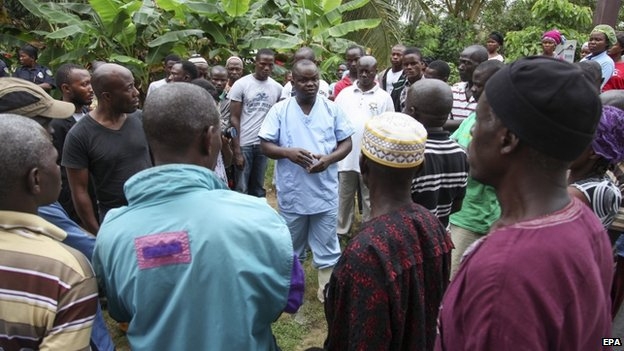
A group of ethicists will meet on Monday at the World Health Organization to discuss the wisdom or otherwise of making an experimental drug more widely available to those suffering from Ebola.
Ebola is named after a river in the northern part of the Democratic Republic of Congo. Statistically, it is a relatively trivial disease, killing a few thousand people since its discovery in 1976.
In contrast, malaria and tuberculosis each kill several million people each year. Measles killed 122,000 in 2012. Yet, Ebola has captured the public imagination. We do not know which animal harbours the virus although bats have long been suspected, and this makes prevention and control difficult.
The clinical manifestation is dramatic, with rapid progression from infection to cell death and symptoms that can include bleeding, vomiting and diarrhoea. The fatality rate is high, ranging from 50% to 90%.
Stigma
A common feature of Ebola epidemics is stigma. Sufferers and survivors are often stigmatised by the community, and so too are hospital workers.
In past outbreaks, some survivors were not welcomed back into their community, some were unable to find work, and some were abandoned by their partners. In the Ugandan outbreak of 2000/2001, the possessions and homes of some survivors were burned.
Volunteers trained by the Red Cross visited villages to dispel myths and persuade them to accept the return of survivors. One survivor of the 1995-1997 outbreaks in Gabon described how people would walk backwards away from him, taxis would not stop and, at roadblocks, police would wave him through for fear of touching his identity card.
Hospitals, often ill-prepared to deal with Ebola, have played a role as amplifiers of epidemics in the past. Many victims since 1976 have been healthcare workers. This gave rise to rumours.

In the 1995 Ebola outbreak in Kikwit, Democratic Republic of Congo, the link between the hospital and those dying of Ebola was such that it generated a popular rumour: doctors were murdering workers who had smuggled diamonds out from the nearby mines.
Hostility
In the Ugandan outbreak, locals believed white people sold the body parts of the victims for profit. Western medical staff were viewed with suspicion, and sometimes suspected of bringing in the disease in.
Every major outbreak of Ebola has been met with local resistance and hostility. In January 2002, an international team of experts fled a village in Mekambo, Gabon, when the villagers threatened them with violence. It is not just the locals who are frightened, but the medical staff too.

Medical historians have documented the cultural disdain for local African customs shown by the colonisers of the early 20th century, for example in the response to the sleeping sickness epidemic that afflicted the Belgian Congo. This sometimes led to revolt on the part of villagers, who were forced to take drugs whose efficacy they doubted and who were touched and prodded in unfamiliar ways.
Funeral practices have also played a role in spreading the disease, but interfering with these has led to discontent. In past epidemics, locals have simply ignored the recommendations not to bury the dead as before, or not to hunt bush meat.
Some communities have relied on more accessible and familiar traditional healers, and these could spread the disease by cutting the skin or performing other invasive procedures. The health infrastructure in some of the countries afflicted by the disease is poor.
Informed consent
It is against this complex historical, cultural and social background that the ethicists this week will need to make a decision. The norms of medical ethics, such as informed consent, may also be different there, and there is a danger in transposing Western norms into different cultures.

A well-known saying in ethics is that “good ethics starts with good facts”. Ideally, sitting around that table will be medical historians, anthropologists, clinicians, epidemiologists, logisticians and other specialists. Only then can a nuanced appreciation of the likely risks and benefits be determined.
This will include anticipating what might happen if the drug is introduced and proves ineffective or even harmful, how the media and the local community will react and the consequences of this reaction for victims, healthcare workers, and others, and how the selection process for candidate drugs should take place. Without this input from other disciplines and an understanding of the situation “on the ground”, the views of the ethicists may be of limited practical value.
Source: BBC- Dr Daniel Sokol, PhD, is a medical ethicist and barrister at 12 King’s Bench Walk Chambers, London.
